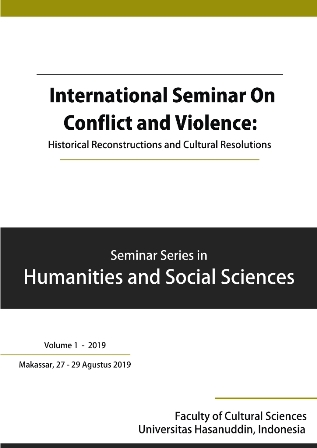SIRIH-PINANG: LOCAL WISDOM AS AN ACTIVE NONVIOLENT APPROACHES OF CONFLICT RESOLUTION (CONFLICT OF EXTENSION PALM OIL LAND AS A CUSTOMARY LAND OF IWARO TRIBE, SOUTH SORONG)
DOI:
https://doi.org/10.3405/ssihss.v0i1.8620Abstract
Papua is the second largest island in the World after Greenland. The issue of customary land has become a very frictionful communication between the community and the company as well as between the community and the other community carrying clan and tribal relation. The customary land that is in dispute is in South Sorong Regency, West Papua is a forest that is used as a place for hunting, squeezing sago and land foraging together for the Iwaro tribe. Conflicts erupted when oil palm companies came to the area and began clearing their oil palm plantations in the Iwaro tribal forest. Debate over the boundaries of customary forests is a quite complicated problem because indigenous peoples are based on natural boundaries, while companies measure modern size.Conflict escalation is indicated by negative reactions shown through apathy, aggression, and dissatisfaction. In the affected community, this attitude was revealed in several emerging behaviors such as barking, stoning, intentional burning of forests, and various kinds of demands that were instant-transactional. The fussiness of indigenous people towards the company actually comes from the process of "releasing" customary land in the company's concession area. The company considers what they have been done was legally and follows licensing procedures and legislation in the process of taking over land that has been used as an oil palm plantation area. While the community has customary laws that are in accordance with the procedure, it must be carried out by the company as a way to pass their ancestral land.In resolving a problem, the Papuan people still use customary law as a source of law that is implemented. Through this study, the authors analyzed how conflict resolution was carried out by the Iwaro tribe. By using participatory quality methods, the authors see active nonviolent approaches using local wisdom are an important part of conflict resolution without litigation path to achieve a sustainable peace.Keywords: Local Wisdom, Active Non-Violenct Approaches, Conflict Resolution, Customary LandDownloads
References
Bushar, Muhammad. 1983. Pokok-pokok Hukum Adat. Jakarta: Pradnya Paramita.Chandra, Robby. 1992. Konflik dalam kehidupan sehari-hari. Yogyakarta: Kanisius.Christie, Daniel J. et. al. 2001. Peace, Conflict, and Violence: Peace Psychology for the 21st century. Englewood Cliffs, New Jersey: Prentice-Hall.John Dear. 2007. Intisari Ajaran Mahatma Gandhi: Spiritual, Sosio-Politik dan Cinta Universal, terj. Siti Farida. Bandung: Nusa Media.Koentjaraningrat. 1994. Irian Jaya: Membangun Masyarakat Majemuk. Jakarta. Jambatan.Malik, Ichsan. 2017. Resolusi Konflik: Jembatan Perdamaian. Jakarta: Kompas Media Nusantara.Malik, Ichsan, et al. 2003. Menyeimbangkan Kekuatan: Pilihan Strategi Menyelesaikan Konflik atas Sumber Daya Alam. Jakarta: Yayasan Kemala.Moleong, Lexy J. 2011. Metodologi Penelitian Kualitatif. Bandung: PT. Remaja RosdakaryaNavarro-Castro, Loreta& Nario-Galace, Jasmin. 2010. Peace Education: A Pathway to a Culture of Peace. Quezon City, Philippines: Center for Peace Education Miriam College.Purwoko, Bambang (Ed). 2017. Desentrasi Radikal, Ikhtiar Pengembangan Wilayah Imekko, Sorong Selatan, Bantul: Ifada Publishing.Rohmad, Abu, 2008, Paradigma Resolusi Konflik Agraria, Walisongo Press.Sugiyono. 2014. Metode Penelitian Kuantitatif, Kualitatif, dan Kombinasi (Mixed Method). Bandung: Alfabeta.Pratiwi, Shrimanti Indira. 2015. Penyelesaian sengketa tanah ulayat antara masyarakat hukum adat dengan taman nasional Tessonilo [Tesis]. Malang (ID): Fakultas hukum Universitas Brawijaya.Webel, Charles & Johan Galtung. 2007. Handbook of Peace and Conflict Studies. New York: Taylor & Francis.H.M. Galang Asmara, Arba & Yanis Maladi. 2015. Penyelesaian konflik pertanahan berbasis nilai-nilai kearifan lokal di Nusa Tenggara Barat. Direktorat Jenderal Pendidikan Tinggi: Fakultas Hukum Universitas Mataram.Drs. H. Basri, M.Si & Drs. H. Nurhamlin, MS. 2014. Konflik Masyarakat dan Perusahaan perkebunan serta alternatif penyelesaiannya di kabupaten Rokan Hulu. Fakultas Sosial dan Politik Universitas RiauAlting, Husen. 2013. Konflik Penguasaan Tanah di Maluku Utara: Rakyat versus Penguasa dan Pengusaha. Jurnal Dinamika Hukum Vol. 13 No. 2 Mei 2013, Fakultas Hukum Universitas KhairunKristanto, Dedy. 2017. (Re) Negosiasi Batas Antar Suku di Perkebunan Kelapa Sawit Sorong Selatan.Rumansra, Enos Henok & Enrico Kondologit. 2017. Pola kepemilikan dan Penyelesaian Konflik Tanah Adat di Papua. Materi PresentasiSuryawan, Ngurah I. 2015. Investasi, Kompleksitas Suku Bangsa, dan Transformasi Masyarakat Papua. Materi Presentasi.

